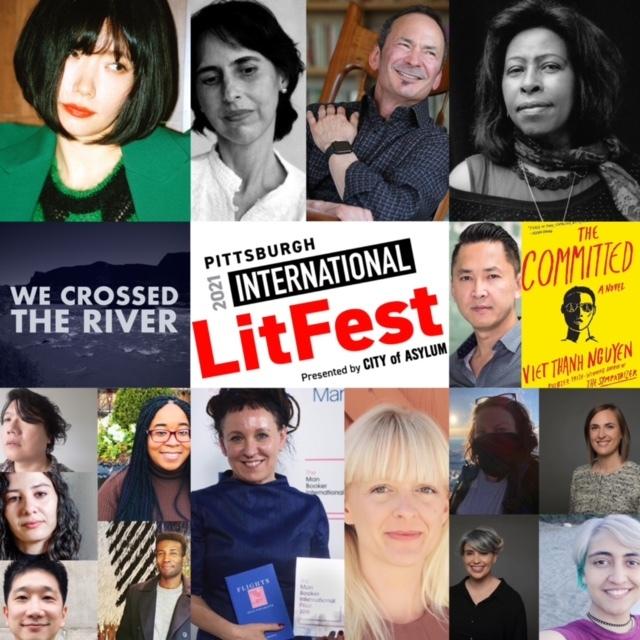International Literary Festival seeks to bridge cultural barriers with translated books
Image courtesy of City of Asylum
All the events being held between May 12 and May 21 by City of Asylum, a Pittsburgh-based non-profit that provides sanctuary for writers who have been exiled under threat of persecution from their home countries, center around translation and themes of identity, migration and displacement.
May 19, 2021
Translation, often a forgotten part of the literary process, allows stories from all over the world to be more accessible to a wider audience. City of Asylum is celebrating translation with the first annual Pittsburgh International Literary Festival, also known as LitFest.
LitFest is running from May 12 to May 21, and all the discussions and panels will focus on literary translation and themes of identity, migration and displacement. Authors from all around the world, from Japan to Rwanda, are taking part in these events via Zoom.
City of Asylum is a Pittsburgh based non-profit that provides sanctuary for writers who have been exiled under threat of persecution from their home countries, and Abby Lembersky, the director of programming at CoA, said the idea behind LitFest was rooted in that goal.
“Our mission is to build a just community by protecting and celebrating creative free expression,” Lembersky said, “and the point of all of our programs is to build a community that is connected through global voices, to provide a platform for global voices and to promote cross cultural exchange.”
Upcoming and previous events can be viewed on City of Asylum’s Crowdcast page, and feature talks with award winning authors, translators and academics such as Mieko Kawakami, Olga Tokarczuk, and Viet Thanh Nguyen.
All the talks at LitFest are specifically focused around translation as part of the goal of promoting cross cultural exchange, due to its significance and the work that goes into it. Lembersky said that translating literature is not as straightforward as simply running the text through Google Translate.
“Literary translation, as you can imagine, is an art … in and of itself, because it’s not just about transcribing, or taking, you know, a sentence of [a specific work] and directly translating it, there’s some manipulation of the word,” Lembersky said. “If you’re writing a character, you’re not necessarily writing in your own narrative voice.”
Ilan Stavans, a translator, literary scholar, professor at Amherst College and publisher, gave a talk last Sunday about his new work from UPitt Press “Selected Translations.” The volume contains translations of more than 40 poets. Stavans said that translation requires a concrete understanding of the piece.
“It’s a challenging effort. The task that you have at hand is to make the poem come alive in the target language,” Stavans said. “You have to really get to live with a poem very intimately, and then recreating it takes time, patience, a lot of drafts, but it’s very rewarding.”
Stavans speaks several languages, including Spanish, Yiddish and French. He said he’s always been interested in languages and exploring cultures through them.
“I’m very interested in how languages work, and how you can say things differently in different tongues,” Stavans said. “I’ve also learned through them about those cultures. My grandparents are immigrants from Poland and from Ukraine. When they arrived in Mexico in the 1920s, they spoke many languages, too. So I’ve tried to keep the heritage.”
Stavans said translation is necessary to keep us from becoming isolated in our own cultures.
“Really without translation, we would be trapped in ourselves. Learning a language is very important to understanding the broad, wild world,” Stavans said. “One becomes more humble when one learns other languages and begins translating from them.”
Another event was a conversation between Rwandan author Scholastique Mukasonga and Jeanne-Marie Jackson, a professor of world literature at Johns Hopkins University. The discussion focused on Mukasonga’s autobiographical works, and an interpreter was there to help facilitate the conversation.
Jackson said that, for her, the discussion shed light on the difficulty of choosing to express an event from one’s life, either in the form of a memoir, novel or short story.
“One thing I took from the conversation was the challenge of moving between craft and spontaneity,” Jackson said about the panel. “Mukasonga is a writer who works and thus on some level frequently chooses among multiple forms — it can be difficult, bordering on impossible, to pinpoint why a certain memory corresponds to one or the other.”
Jackson said translation allows others to take the burden of making a work accessible to a global community off of the author.
“Scholastique Mukasonga, who writes in French, should not be the one ensuring that her work is read by the countless speakers of other languages,” Jackson said. “The work’s circulation is for others to worry about … In this way, the practice of translation becomes an essential part of sustaining a literary community.
Lembersky said City of Asylum plans to host this event annually, be it in person or virtually to allow for more international authors to come.
“We’ll have to see what next year looks like,” Lembersky said. “It will always continue to be international and will always continue to focus on global voices in translation. But there’s many, many different approaches.”
Lembersky said hopefully this will be an opportunity for students and people throughout the Pittsburgh community to learn more about the global experiences.
“The power of something like this is getting exposed to stories and experiences from around the world, and being able to share space with authors and artists who are around the world,” Lembersky said. “By hearing the stories of these authors, students are experiencing more of the world and bridging differences.”




